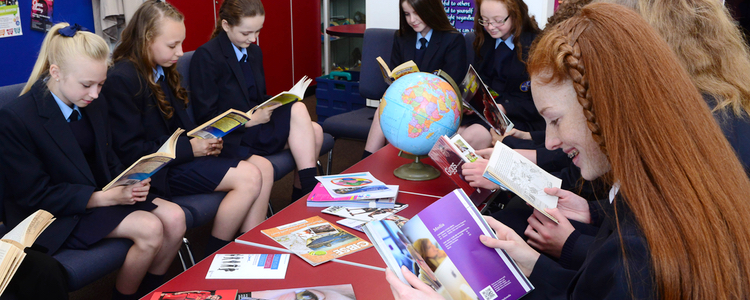
Reading Strategy
Reading Team
- Mr B Chorley
- Mrs J Sweeney
- Mrs C Owen
Intent
Reading is at the heart of the All Saints curriculum. Our intention is to ensure no child is left behind and so our reading curriculum is wholly inclusive. Pupils need to be given every opportunity to flourish and become fluent and accurate readers. The key to achieving this is early intervention for struggling readers, teaching reading through every subject discipline and inspiring and challenging all through enrichment.
Implementation
Intervention
Early identification of struggling readers is key to ensuring that pupils get the support they need. We use the NGRT reading assessment and test all pupils at twice yearly intervals, with those in intervention cohorts being tested more regularly so that we can track progress and quality assure the intervention practices. After researching several reading assessment programmes, we decided that the amount of data given for each pupil following this particular assessment was going to be the most useful to inform next steps. Pupils are given more than just a reading age. Each pupil report also gives a list of practical and personalised reading strategies for staff to use in the classroom.
We have several intervention programmes including phonics for early readers, 1-1 daily reading support, small group reading sessions and form time reading.
Reading in Subject Areas
All staff at All Saints teach reading. Staff have been trained in the teaching of phonics and all subjects have their own reading strategies and resources that are unique to their areas.
- Pupils explore word etymology in science lessons to help make links between key scientific vocabulary.
- In History, pupils read extracts from fiction texts such as Private Peaceful to raise engagement when studying World War 11.
- Pupils read autobiographies such as ‘From Gangland to Promised Land’ in RE.
- Sports students enjoy the inspirational book Legacy- a book about leadership inspired by the All Blacks rugby team.
- The Art department uses dictionaries of artists, art movements and artistic terms to complement the curriculum.
Pupils are taught subject specific tier three vocabulary in every subject.
We ‘Turn on the Subtitles’ whenever we watch youtube clips, documentaries and films etc and encourage our parents and carers to make sure the children do this at home too.
Choral reading strategies are used across the school to help improve reading fluency. Our daily collective act of worship is read chorally in forms each morning.
Reading Enrichment
We participate in the yearly Book Buzz initiative that is run by the Literacy Trust. All Y7 and 8 pupils select a book from a choice of 17 titles- both fiction and non fiction- that they read during one form time a week and at home. This book is part of their equipment and included in the tutor check each morning. We take the swap shop approach so pupils get to read and review as many books as possible across the school year.

Our reading enrichment coordinator also runs a Book Flix competition for years 9 and 10 whereby pupils are challenged to read as many books as possible. We promote this in English lessons, assemblies and on our social media pages and participation this year has been outstanding.
We work in collaboration with our librarian to map out and calendar events and organise clubs that promote and encourage reading. Our library is in the process of being updated and this summer we added 500 new books based on staff recommendations- again we encouraged and supported requests to boost the subject specific sections of the library. High profile events involve the whole school- yesterday for example, all pupils and staff enjoyed celebrating National Poetry Day. Pupils read, listened to and wrote their own poems based on this year’s theme, which was ‘Choice’.
Impact
We are seeing the impact of our reading strategy on a daily basis. Pupils are enjoying reading their chosen books during form time and breaks, they are reviewing, swapping and recommending books to their peers. In recent student council meetings, pupils spoke confidently about what they are reading across the curriculum and about our whole school vocabulary focus. We have been able to make changes to intervention cohorts as students move through the sessions and have every confidence that our end of term assessment data will continue to evidence improved reading progress for all.